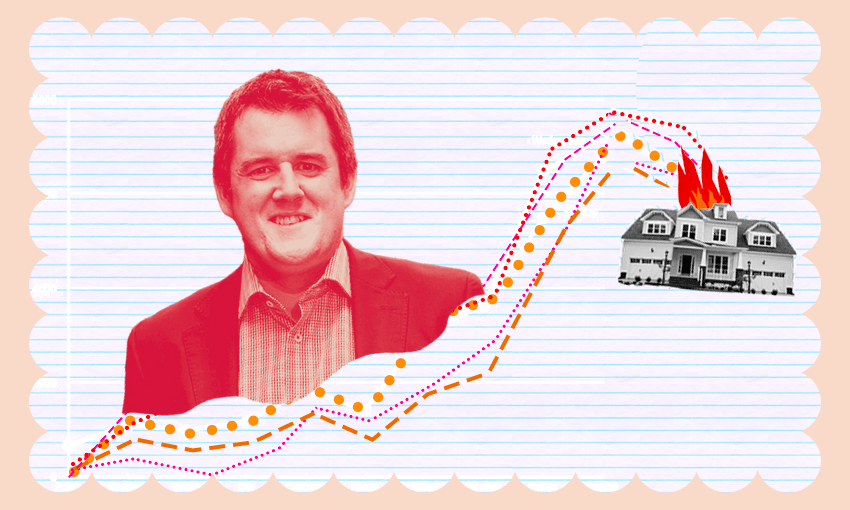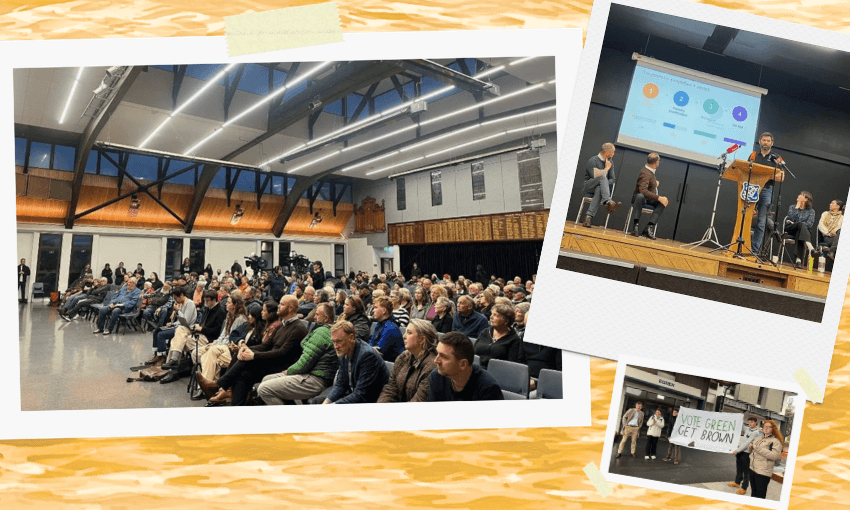A housing minister willing to publicly discuss house price falls is encouraging, but true affordability is likely to remain a long way off, writes Max Rashbrooke.
House prices must always rise. For as long as I can recall, this has been one of the core assumptions of Kiwi politics. It has seemed like a long-run item of faith, a central tenet in the national religion of property investment.
Metiria Turei learnt this to her cost in 2016, when the then Greens leader told Morning Report prices needed to halve – over a period of time, but halve nonetheless – if homes were to become affordable once more. Labour leader Andrew Little called her “irresponsible”, and the public, according to Greens I spoke to at the time, “freaked out”. More recently, Jacinda Ardern sought nothing more alarming than a “sustained moderation” in prices.
But on Monday, the housing minister, Chris Bishop, dipped his toe into these dangerous waters. Asked by Herald reporter Thomas Coughlan if prices should fall, he simply replied: “Yes.”
“Average house prices to the average household income are too high by any objective measure. They are severely unaffordable by international standards,” he added. “The flipside of house prices falling for people who own homes is that they become more affordable for people who don’t.”
So far, Bishop’s laudable comments have not brought the proverbial house down upon his head. On the Stuff story carrying his remarks, the responses were mostly – though not universally – positive.
Possibly this is because Nats can get away with saying things Greens can’t. But it could also represent the slow movement, from the fringes to the mainstream, of the view that house prices are just too high, and therefore must fall. As indeed they’ve done in the past. Relative to incomes, house prices declined sharply from the mid-70s to the mid-80s. And in the last few years they have dropped from their ridiculous pandemic-era peak.
Crucially, though, Bishop hasn’t been explicit about what he wants. When most people hear “house price falls”, they think of a scenario where a house that’s valued at $800,000 one year is worth, say, $790,000 the next. But if house prices increase at a slower rate than inflation, that still counts as an “inflation-adjusted” or “real terms” fall. If, in other words, a house valued at $800,000 sells for $808,000 (that is, 1% higher), but inflation is 2%, the value of the house has “fallen” relative to the costs of other goods.
When The Spinoff asked on Tuesday which scenario he meant, Bishop’s office said only that he “stands by his comments yesterday and all previous comments around housing affordability”. Which reveals nothing – except that he isn’t taking up the opportunity to say, “Yes, absolutely, I want the actual dollar value of homes to drop.”
One might ask: so what? There is no knob marked “house prices” that the government can turn up or down with infinite precision; only the broad aim matters. And that’s a partially fair point. It’s helpful – encouraging, even – to have a housing minister talking about house price falls of any kind.
But still the distinction does count. First, it’s the difference between really facing down anxious homeowners versus still not wanting to frighten the horses, à la Ardern. The scale of government action needed to achieve the two scenarios is also somewhat different.
The distinction, finally, matters for the path back to affordability, usually defined as prices being only three times incomes. The average house-price-to-income ratio, according to interest.co.nz, has fallen from its 2021 peak of 9.3 to a mere (!) 6.9 today. That’s because the average house is now valued at $790,000, and assuming a prospective house-buying family of two 30-year-olds, 1.5 incomes and one child, the average income available is $115,000. (Other assumptions give higher ratios.)
If one then projects that incomes will rise 2.5% above inflation each year, as they did in the decade pre-Covid, what does that mean for the “real-terms fall” scenario in which house prices increase by 1% but inflation by 2%? It means at least a two-decade wait before we get back to a situation where house prices are three times incomes. Such slow-and-steady progress would nonetheless represent a long wait for those currently locked out.
If house prices freeze (in actual dollar terms), affordability might return a little quicker: in 15 years, say. But to get back to the three-to-one ratio within a decade, prices would have to fall something like 3% a year in actual dollar terms.
That may not sound like much, but it is. A house that’s worth $790,000 one year is only worth $721,000 (in actual dollar terms) after just three years of 3% falls. By the end of the decade it is worth only $580,000.
These are all rough numbers: a spreadsheet not a detailed model. Nonetheless those are the kinds of projected falls to make homeowners, well, freak out. Some would soon owe the banks far more than their houses are worth. Those with their retirement hopes pinned on an investment property would – rightly or wrongly – be in some trouble. And if the “wealth effect”, in which people spend more when their house value rises, is real, the economy would slow.
Nor is it clear how far public opinion has shifted. It’s true that, for some time now, polls have shown support for house price falls as a concept: in 2022, three-quarters of New Zealanders backed the idea. Last year they were far more likely to be “optimistic” rather than “worried” about price drops.
But that is very different from saying that one’s own house price should fall – and the last time that, as far as I know, the public was asked that specific question, just one-quarter responded favourably. This is probably why, as Hayden Donnell and others have noted, any media mention of falling prices is related in the same tone one might use to announce the death of a beloved relative.
This may change: the “aspirant homeowner” and “parents of aspirant homeowner” demographics may come to outweigh the “hands off my house price” cohort. Media coverage may shift. But if not, any real assault on prices would require National to face down two-and-a-half years of negative headlines before the next election – and, as above, countenance some startling declines in house values.
This is the problem with having allowed prices to rise to such insane heights, over so many years: the unwinding is liable to be either painful or slow. And it’s worth noting that Bishop has publicly pledged only to achieve house prices of “three to five” times incomes – which provides some wriggle room. Merely freezing prices could get us to the upper bound of Bishop’s target early next decade.
Of course no one can predict exactly how prices will respond to any given set of government actions or wider economic shocks. And Bishop is a canny politician: if he’s willing to publicly discuss house price falls, something in the debate has clearly shifted. But a gentle stasis is still much more likely to be National’s dream scenario than anything that brings affordable housing more quickly into view.





